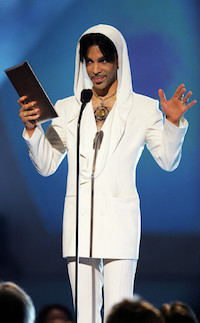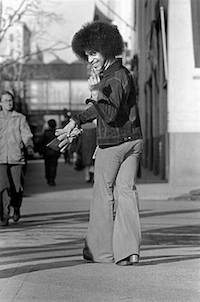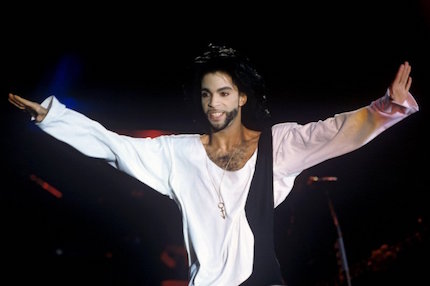It is impossible to understand Prince (1958–2016) without one of these two powerful forces, but the same could be said of many of us.
 Prince dedicated all his albums to God.
Prince dedicated all his albums to God.
Sex and religion are two powerful forces that dominate our lives. It is impossible to understand Prince (1958–2016) without one of these, but the same could be said of many of us. What is strange is the way in which he brings together the erotic and the divine, leaving both his secular and religious audiences perplexed. In his albums, Prince gives thanks to God, while also celebrating the pleasures of the flesh… a strange combination?
His sudden death has highlighted how little we know about him. All is speculation and enigmas. His biographies – which I have been reading over the last few days – are full of the adulation of his followers or the criticisms of embitter co-workers. Nothing seems to come from Prince himself…
 The death of Prince has shown that we do not know much about his real life.
The death of Prince has shown that we do not know much about his real life. It still moves me to hear him speaking so timidly, slowly thinking about his words. Everything about him gave the impression of fragility, until he got up on stage, where he became a real entertainment animal. His spectacular dance moves showed off a body control that would be difficult to achieve with the addictions that he is rumoured to have had. The legend becomes mixed up with the image that he himself projected, even concerning his sexuality.
His androgynous look and calculated sexual ambiguity are reminiscent of David Bowie, whose bisexuality would now be seen more as bi-curiosity. Everything to do with them seems so twisted and complex that they must either have been so peculiar that they fell outside all know categories, or it was all an act. That is as far as the parallel goes. While Bowie’s spirituality is syncretic and eclectic, Prince’s is clearly an increasingly sectarian form of Christianity, eventually becoming a Jehovah’s Witness at the beginning of the century.
HIS MOTHER’S SON?
In this as in everything, Prince was his mother’s son. After his parents’ separation, when he was ten, he was brought up as a Seventh-day Adventist, but before dying, she made him promise her that he would become a Jehovah’s witness, like herself. This genius from Minneapolis not only inherited his religion from her, but also discovered his sexuality through her. He tells of how he found pornographic literature and vibrators in her room. This stimulated his boundless passion for eroticism, while she also fired up the spirituality which led him to tell her that he had seen an angel that had told him that he would have no more epileptic fits.
 Prince had a solitary adolescence, obsessed with pornography.
Prince had a solitary adolescence, obsessed with pornography.Although he learnt to play the piano with his father, who was a jazz musician and gave him his artistic name, he had a bad relationship with him. His son believed that he struggled to show his feelings, like most other men. When his mother got remarried, he didn’t get on well with his step-father either and he went back for various stints with his father, who gave him his first guitar. Prince could play up to twelve instruments by ear.
Prince liked to play basketball, but he was so short that he had to buy kids’ size clothing and always wore heels. Not only was he bothered by his height, like Michael Jackson, but he also preferred lighter skin and claimed to be a mestizo, even though his parents were Afro-American. This was part of the distorted information that he gave out, including that he was born in 1960, instead of 1958.
It is rare to find matching information in his biographies. For example, the sexual precociousness according to which he said that he had participated in adolescent orgies, is denied by his second cousin, Charles Smith, who spent a lot of time with him around that time. In reality, he was a rather solitary adolescent, obsessed with pornography and masturbation.
HOLY LUST?
Although his favourite singer was the folk artist Joni Mitchell, his inspiration as a guitarist was Jimi Hendrix, which explains his obsession with purple. His music was funk in the style of Sly Stone, whose base player Larry Graham became a Jehovah’s Witness in 1975. They spoke a lot about religion with Prince and they even did Bible studies together, before and after his concerts.
All his albums are dedicated to God, from his first album in 1978, but they are also full of sexual references, like his first single “Soft And Wet”. At the time, he sang in falsetto, in the style of Smokey Robinson. When he went back to recording at the end of the 1970s, he had already become a gay icon. He was always heterosexual, but he thought that it was fun to dress up as a woman. He had a “dirty mind”, as in the title of his next album, which Warner distributed with a warning that it contained language that might be unsuitable for certain listeners. In it, he not only sang about oral sex, but also about incest with his sister, even though the 1981 vinyl also contains the Lord’s Prayer.
 At times, Prince seemed to have a Messiah complex.
At times, Prince seemed to have a Messiah complex.This combination is reminiscent of Marvin Gaye (1939–1984), another Afro-American artist, son of a Pentecostal minister in a church that was so legalistic that it was know for its strict adherence to the ten commandments. Gaye was killed by his own father, who was obsessed by virility and considered that his son had become effeminate, having also discovered that he secretly dressed up in his mother’s clothes. After many arguments, they were reunited at a time when Gaye’s life was dominated by drugs and pornography. He only had relations with prostitutes but never stopped reading the Bible. It was open at the book of Psalms when he was killed, the night before his 45th birthday, while talking on the phone with his mother. His father shot him with the gun that he had for the purpose of protecting his family.
JEHOVA’S WITNESS?
Gaye’s tragedy can be compared to Prince’s in his incapacity to find freedom in a legalistic religion. “Both of his parents believed in the strict faith as did Bernadette Anderson, who took him in after he left home”, says Touré, the biographer who has written the book that focuses most on this subject, “I Would Die 4 U”. He attended a small Kingdom Hall next to his house and he fulfilled his obligations as a “publisher", taking him out onto people’s doorsteps with copies of the The Watchtower, as in the case of a Jewish couple in 2003, the year that he was baptized in Chanhassen.
It is not clear whether he abstained from an operation on his hip to avoid receiving a blood transfusion, but he said that he did not vote in the elections, as per the practice of Jehovah’s Witnesses. He described his conversion more as an “awakening”, using an image from the film “Matrix”. According to his elders at the Kingdom Hall, “He was a spiritual man … and he very strongly believed in the message of the Bible that Jehovah Witness’s proclaim”. Brother Cook – who is now 81 years old – says that “We didn’t see him very often because he was away all the time, but he did attend the memorial of Christ’s death on March 23 here”. When he came to church, he was “modest”, and “very, very humbly”, dressed in a black suit. He brought his New World translation of the Bible, covered in notes, waiting for brother Nelson’s exposition on the the Scriptures…
 Prince participated in a small Kingdom's Hall near where he lived.
Prince participated in a small Kingdom's Hall near where he lived. Had Prince changed that much? What had become of his fancies and extravagance? His guitarist, Dez Dickerson – according to Touré’s book – said that “There’s maybe three Prince personas. One of them is a very calculated marketing mind. That’s where the ‘embodying pure sex’ thing comes from. Another of them is ‘I’m gonna be the baddest musician there ever was.’ And then there’s the guy who really is thoughtful and introspective and holds religious considerations close to his heart and ponders those questions sincerely and genuinely and deeply”. Prince had many faces, but then, who doesn’t? It is easy to accuse someone like him of incoherence.
A person only has to declare themselves religious, to be qualified as a hypocrite. What happens is that when someone makes art as honestly as he did, they really demonstrate all their complexity. This is the difference, as Bono has said in these last few days, between so-called “Christian music” and the Psalms in the Bible. In it we can see the whole range of human emotions from rage to exasperation, sadness and joy. That brutal honesty is what allows us to see the contradictions in Prince. Together with Bono, I would also like it if the people who write those beautiful Christian songs, also spoke of their frustrated marriages or their feelings of anger against the authorities. I also think that honesty would turn everything upside down.
SACRED SEXUALITY?
The contradictions in Prince are well reflected – as Touré observes – in his album “Let’s Go Crazy”, with “Erotic City” on its side B. It begins with an invitation to “pretend we’re married”, which is all about oral sex, but he ends up saying “I am in love with God / He’s the only way”. It is as if Prince were saying that sex is good, but “let me talk to you about Jesus Christ a little bit”. He ends up preaching at you…
According to his former manager, Alan Leeds, for Prince “the love of God and the sexual urges we feel are one and the same somehow. For him it all comes from the same root inside a human being. God planted these urges and it’s never wrong to feel that way. The urge itself is a holy urge.” It is the old idea of “sacred sexuality”, which the Bible rejects with its rites of fertility. It is true that Song of Songs uses sex as an analogy of divine love, but it does not turn it into a spiritual activity in the style of the mysticism that compares orgasms with religious ecstasy.
This becomes all the more confusing in songs like the one that gives its title to Touré’s book, where Prince puts himself in Jesus’ place and says: “I would die for your / I’m your messiah” (I Would Die 4 U). It sounds blasphemous, but he claims, “I am not human/I am a dove/I'm your conscious/I am love” as if God spoke to this woman, who is “just a sinner” and presented himself as her Saviour. The problem is that in Prince’s egomania, everything sounds as if he had a “Messiah complex”.
AND IF?
Last year, Prince surprised everyone covering a song by a Christian singer-songwriter, Nichole Nordeman, “What if”, all about doubt and faith. In it, she sings: “What if there's more?/What if there's hope you never dreamed of hoping for?/What if you jump?/And just close your eyes?/What if the arms that catch you, catch you by surprise?/What if He's more than enough?”. My desire is that His loving arms have received him. It is not up to me to say who is to be saved. “By their fruits you will recognize them”, Jesus says in Mathew 7:16, but I only know Prince through his songs. And no one will be saved through song. Even if we say, “Lord, Lord” (v. 22-23) …
I believe that Jehovah’s Witnesses are in the wrong when they declare that Jesus is the Son of God, but that it does not mean that he is one with God, as the Bible says he is. Whoever declares that Jesus is not Lord, contradicts the basic confession that identifies one as a Christian (Romans 10:9; 1 John 4:2). The thing is that, as the Church Fathers and the Reformers believed, it is possible to have faith within a sect, or in a Church that has still not been transformed by God’s Word. That is why when Dr. Lloyd-Jones received a letter from a man that liked his sermons so much that he repeated them in his Kingdom Hall, the great Welsh preacher told him to carry on doing so.
It is clear that music had a purpose for Prince, as Touré has said. That purpose was to talk about the Word of God and of Jesus as the Son of God, as acknowledged by Kevin Smith –director of the blasphemous film Dogma –, when he tells of the week that he spent in his house in Paisley Park, asked to produce a video for him. It is true that “he deviated from his path”, as his biographer says in the New York Times obituary. What impresses me about him, is that he tried to bring together what Christians so often try to separate, when he showed us that we do not need to separate what we do on a Saturday night from Church on a Sunday morning.
For that reason alone, he already deserves my attention, much more so than many Christian artists. It is down to what Bono would call his “brutal honesty”.

Las opiniones vertidas por nuestros colaboradores se realizan a nivel personal, pudiendo coincidir o no con la postura de la dirección de Protestante Digital.
Si quieres comentar o